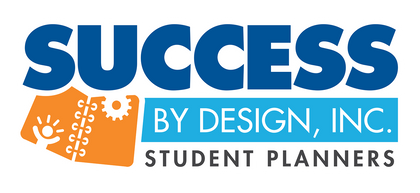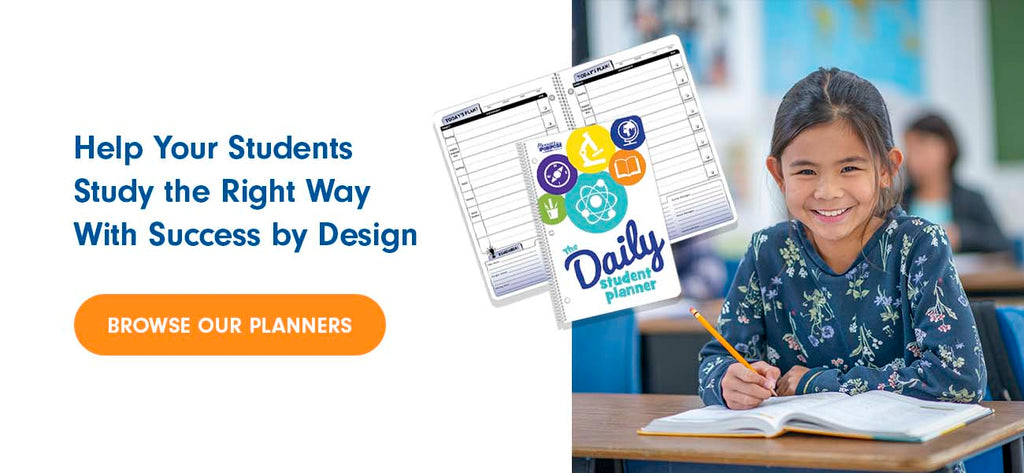How to Make Studying Fun for Your Students

Any teaching facility always looks for ways to improve children's academic performance without compromising their enjoyment of the course material and engagement with their teachers. Starting in elementary school, teachers and administrators must consider preparing students for tests. However, they must also cultivate skills in these early years that carry students through their academic careers and work lives.
Teaching study skills to elementary students is essential to equip them with the tools they need as their workloads increase. The association they make with studying in elementary school is critical. Educators can create positive associations with studying at an early age. If you make learning fun, you lay a solid foundation for each student's future.
Making Studying Fun: Why Does It Matter?
Students who spend more time in effortful, active study and use more study strategies achieve higher scores in exams. Exposing them to these skills in elementary school lays the foundation for their academic careers and beyond. They need to form positive associations with the process and make it part of their routine, and the best way to achieve this is to make it fun from the outset.
Study skills go beyond studying. They're not just about getting through a test by cramming the night before. Teaching students how to study gives them other valuable skills like time management and organization, allowing them to be responsible and learn from their mistakes. Making the process fun prevents students from becoming overwhelmed or disheartened when they find subjects challenging. Fun study motivates students, improves their ability to learn, increases their exam results and creates a cycle of positive reinforcement.

Some of the many benefits of making studying fun include:
- Improve productivity: We all know the saying about how time flies when we're having fun. A fun environment makes learners more productive and increases their positivity to hard work.
- Boost resilience: Resilience is essential for students as they progress through school. When they have a bad day or find it challenging to understand a topic, laughter reduces their stress and keeps them in a positive mindset so they can rationally approach solutions.
- Elevate creativity: A dull environment means dull young minds. When you make the atmosphere upbeat and enjoyable, it's more likely to inspire students to think outside the box and find creative solutions to their various challenges.
Teaching Students How to Learn: How to Talk to Your Students About Studying
When you give students their first study skills class, you want them to leave excited to study for their first test. Today's learners are more inclined to question what you teach them than in the past, so how you communicate is crucial. You must keep them engaged as you guide them through different study strategies, empowering them to participate actively in their success.
Finding the best way to communicate with students is the first step to creating a positive experience. Elementary schoolers require a different approach to older kids, so keep the following tips in mind to keep them engaged and entertained:
1. Pay Attention
Children need to feel like you're listening to them. Approach them with positive body language and make eye contact with the class. Avoid intimidating postures, facial expressions and tones of voice. Keep your communications warm and upbeat.
2. Encourage Interaction
Avoid lecturing your students. Instead, meet them where they are and encourage them to participate in the class. You can task each student with asking you one question, for example.
3. Make It Personal
Students study best when they understand their strengths and weaknesses. Ask your students to identify their top three strengths and three skills they would like to improve. Explain that while it's your job to prepare them for class tests, they must start taking responsibility for studying further on their own. Guide them through the basics, like having a quiet space to work. Explain that their job is to remember and understand the most critical concepts from the classroom.
4. Set Goals
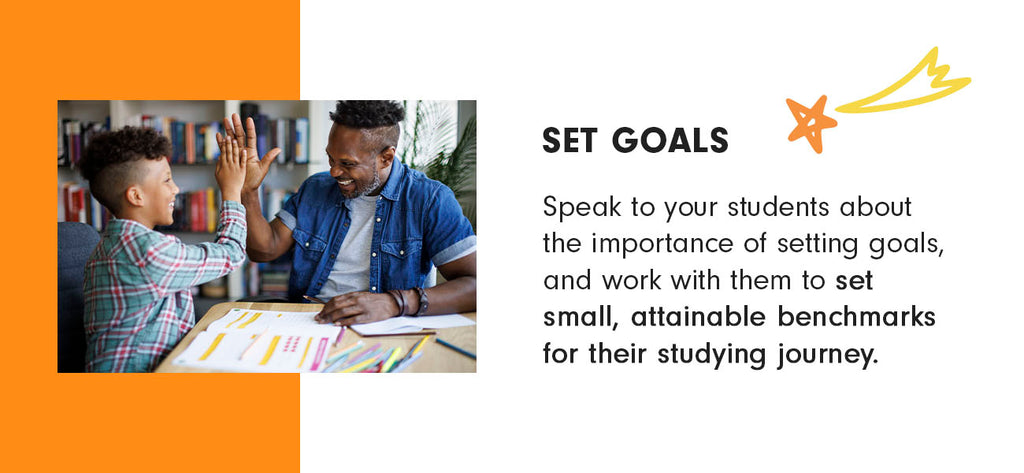
Speak to your students about the importance of setting goals, and work with them to set small, attainable benchmarks for their studying journey. Large amounts of study information are understandably overwhelming, so demonstrate how they can break it into more manageable chunks.
5. Be Approachable
Explain to students that everyone learns differently and that what works for their friends might not work for them. Ensure they can explore different study methods and make mistakes while navigating this new task. Most importantly, normalize asking for help. Many young students are shy about asking for extra help if it's viewed as a sign of weakness. Explain that speaking out when they don't understand something is a sign of strength and maturity that will yield better results in the long term.
Studying Strategies: Developing Effective Study Habits
Students should understand their learning styles and study habits by the time they reach high school. Trying different strategies throughout school is essential to find the best habits for each student. Expose your students to as many options as possible to experiment in their own time and get into a flow that works for them.
At the elementary school level, students still require support as they grasp time management skills, but when they have a clear roadmap of how their study sessions should look, they can use the structure to develop their systems. Go through the following habits in class and ask for feedback as students try them at home:
1. Create a Study Space
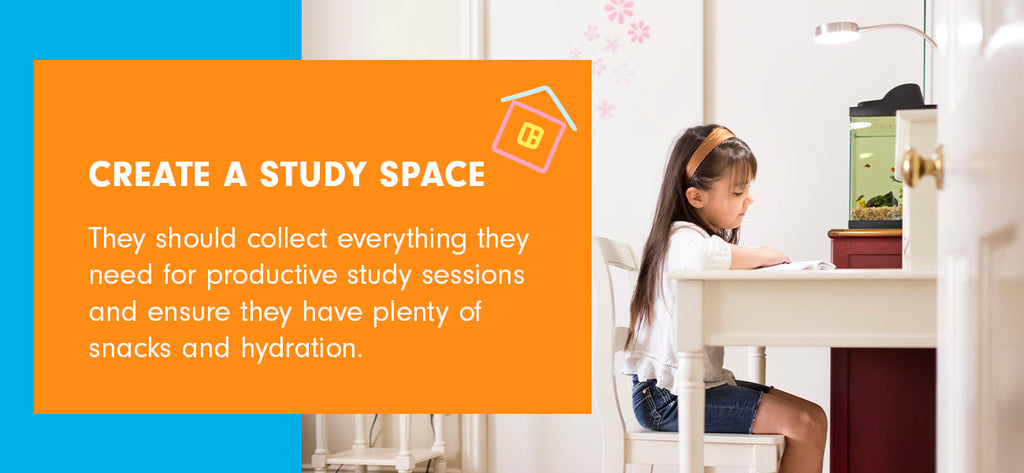
The first thing students should learn is to create a dedicated space to study. Encourage them to look for a quiet area with minimal distractions. This activity can be fun when students make the space their own. They should collect everything they need for productive study sessions and ensure they have plenty of snacks and hydration.
2. Make Study Guides
Many students just read through the course material when they study. As we know, there are more effective ways to digest information than simple scanning. Teach your students to make their own study guides instead of relying on the written material they receive in class.
Start by showing them how to identify the most important information from in-class or written material. Then, show them how to write out questions covering these topics so they can quiz themselves or each other.
3. Take Regular Breaks
Taking short breaks helps our brains learn new skills, making them even more critical in students learning to study while retaining the course material. As an educator, you can frame breaks as rewards for dedication and focus. Explain to them that breaks should be intentional for best results and provide them with a list of refreshing activities, such as:
- Taking short outdoor walks
- Decluttering their desks
- Listening to upbeat music
- Catching up with a friend
- Taking a shower
- Stretching
- Having a snack
Scrolling on social media during breaks can decrease focus, so encourage students to look for more meaningful break time activities.
4. Avoid Cramming
Cramming can carry students through, but they are more likely to forget what they learned after the test. Students should focus on understanding and retaining the work to make future exams less stressful. Suggest they set aside time to review their work at least once a week, spacing out their studying for several weeks before an exam.
5. Set Study Goals
Setting goals can help keep young students motivated to study. Depending on their learning style and preferences, they can set time- or content-based goals, like focusing for 45 minutes or finishing two chapters before taking a break. Explain to students that they shouldn't be hard on themselves if they don't achieve their planned goals. Studying can take longer than expected, especially when they're still learning what works for them and what doesn't. Instead, they should keep taking scheduled breaks and perform at their best pace.
6. Think About Rewards

Rewarding yourself has been linked to better self-control and helps students form positive study habits. Teach students about small rewards for finishing a study session and larger ones for an entire day of productive work. They're more likely to focus on completing their tasks when they have something to enjoy afterward. Small rewards can be a piece of candy or a short episode of their favorite TV show. Larger prizes include spending time with friends or enjoying their favorite outdoor activity.
7. Study Together
Collaboration is a valuable form of learning for students of all ages. Students who work together can help, encourage and hold one another accountable for meeting their study goals. Studying is also more fun in a group. Encourage your students to work together as they master new studying skills and lean on each other to help them understand the work.
8. Ask for Help
The earlier students learn they don't need to tackle complex subjects alone, the better prepared they are to progress through more challenging course material. Teach them to be proactive about identifying areas where they need assistance and ask for it as soon as possible, as the longer they wait, the more challenging it becomes to catch up.
Fun Ways to Study
Making studying fun can be challenging. Kids have to devote some of their free time to working hard, which is an adjustment for many. However, you can give them the tools to liven up the experience so they're always excited to start and feel accomplished and empowered at the end of each session. Our top 12 tips for turning each study session into an adventure include:
1. Introduce Free Time
Students should schedule free time alongside study breaks. During these gaps, they can refresh their minds and forget about work for a while, focusing on enjoyable activities like sports, hobbies, playing outdoors or watching an episode of their favorite show. Breaking up the day is a valuable tool for elementary schoolers, giving them a chance to reset and helping them maintain a good school-life balance from an early age.
2. Use Interactive Learning Tools
Every student learns differently. Some retain information best when they read it, while others must listen or see the concepts in action. Technology improves the learning experience, and in the digital age, plenty of technologies exist to bring studying to life. Students can choose from various studying apps to level up and unlock rewards as they learn.
They can also mix things up with different resources, using various learning formats to keep studying fun and exciting. Consider the following resources:
- Online quizzes
- Video lessons
- Printable worksheets
- Digital guides
3. Get Creative
Studying can be more than a one-dimensional process where students take notes with a pencil. Encourage them to enjoy taking notes and create study guides by getting artistic and creative. Get them some bright colored pens and pencils or even some stickers, and let them explore their creativity in the following ways:
- Color coding: Students can color code their notes, practice fancy calligraphy and incorporate other fun headings to turn each page into a mini work of art.
- Draw pictures: Pictures can help students remember concepts better. Encourage them to draw out challenging concepts and create funny artwork to remember different ideas.
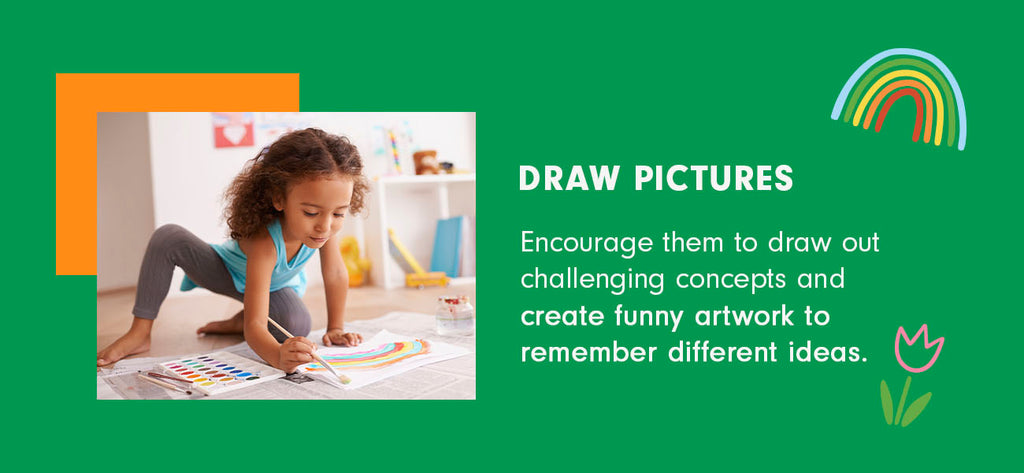
- Make posters: Children love displaying their artwork. Encourage them to make posters for the main concepts and display them around the house. They can tell their families about each one the day before the test.
- Create mind maps: Mind mapping is an excellent way to connect concepts. Students should write the central idea in the center of the page and then think of everything they associate with that concept. They then connect the concepts with lines, like creating branches on a tree.
- Upgrade flash cards: Let students create colorful flashcards to quiz themselves and each other while showing off their artwork.
4. Gamify the Study Process
Everyone loves a good game. Combining games with study sessions is a fantastic way to create positive associations with studying. Many games revolve around conquering the "big boss." Students can assign levels to different lessons or concepts if the test is the big boss. Like a game, they reward themselves with a break every time they achieve a goal or complete a level.
Students who prefer stories can create narratives around their study sessions. Again, the test becomes the final confrontation with the antagonist. Each study session progresses them along the path to eventual victory.
5. Make It a Challenge
Challenges are a great way to keep students motivated to study. Show them how to create small challenges for different study materials, like learning all the facts on a page or reading a set amount of chapters in a given time. When they complete these challenges, they should reward themselves with something fun, a quick snack or a game outside.
6. Dramatize and Dance
Studying in silence is one way to lose motivation. Students are more likely to fall asleep than they are to retain the relevant information. When they need to read large blocks of text, suggest they stage a dramatic reading. Reading aloud can help them retain the information. They can get as silly as they like. This tip works best in groups, where every child gets a turn to entertain their peers.

Releasing endorphins through physical movement also keeps students energetic and focused. Encourage them to take dance breaks so they get away from their desks and move their bodies. It also has excellent health benefits. Even short bursts of movement throughout the day can lower your risk of heart disease.
7. Get Comfortable
A less well-known tip for happy studying is to ensure students are comfortable in their clothes. Invite them to wear clothes they love when they study, whether in pajamas or their favorite superhero outfit.
8. Make It Musical
Listening to music can reduce stress and improve concentration, but the type of music is critical to ensure improved focus instead of more distraction. Ask students to try various playlists and learn what works best for them.
There are other ways to bring music into study sessions. Students can create songs to cover the general points they're studying or sing their notes to the tune of their favorite song. It's also worth checking online to see if someone else has made a catchy song about their topic so they can sing along.
9. Use Mnemonics
Mnemonics are patterns of letters created to improve memory. Show students how to make their own or teach them some common ones like, "Please excuse my dear Aunt Sally" for the order of operations in math — parentheses, exponents, multiply, divide, add and subtract.
10. Involve Your Pets
Although group work greatly benefits studying, it's only possible sometimes. Encourage students to teach their pets about their current study material. They get the same benefits of saying things out loud — better retention of information and a dose of fun. Involving their furry friends is also great for quality time and stress relief.

In the absence of pets, parents can also come in handy. Let the kids be the teachers to help them learn and boost their confidence.
Staying Focused: How to Stop Getting Distracted While Studying
Fun is a crucial part of the study experience, but students must learn to balance enjoyment and focus to get the best from their study sessions. Teaching them to identify when they're losing focus and take steps to regain it provides them with a fundamental skill they will use throughout school, college and their careers. Give them the following tips:
- Cut the clutter: A dedicated study space is one thing, but it must stay clean and clutter-free to remain effective. Students should enjoy being in their study space, which means knowing where everything is and avoiding becoming overwhelmed.
- Remove the social media: Social media is a part of life for most kids. Despite their best efforts, if a student's phone buzzes in their pocket, it can be challenging to resist checking their notifications, interrupting their focus entirely. Ask students to put their phones in another room. If they are studying online, download browser extensions to prevent unwanted pop-ups.
- Remember food and water: When students get stuck in their studies, they quickly forget to eat or stay hydrated. Encourage them to eat and drink during their breaks to remain physically and mentally focused.
- Create a study routine: Creating a routine is a powerful way to prepare students' bodies and minds for study. Think of all the world-class athletes who go through the same motions before taking a shot or diving in the pool. Everyone's routine is different, so ask students to experiment until they find one that helps. A study routine could be as simple as clearing their desks, putting on music or writing the date at the top of the page.
- Track completed tasks: Seeing your accomplishments is excellent motivation to keep going. Ask your students to keep a checklist of completed tasks to fuel their motivation throughout study sessions.
- Find the right study group: Not all study groups are created equal. Students should work with peers who have similar goals and study techniques.
Getting Organized: Plan for Studying Success
Planning and organization are the most crucial study tools you can offer your students. Being prepared and in control can make them less stressed about upcoming tests and exams. Teach your students to use a planner to keep everything they need to remember in one place, including assignments, test dates and scheduled study sessions.
Your students will greatly benefit from understanding the importance of habits and routines. Teach them about the value of organizational skills in their education and careers. Despite all the digital tools available, writing things down with a pen and paper is the best way to absorb and retain information, and writing in a planner is also a fantastic way for them to incorporate handwriting into their daily lives.
When students become organized, it becomes fun as they see the rewards. They learn to plan better to enjoy their free time with family and friends. In short, they can lead more balanced lives without feeling overwhelmed or neglecting their studies.
Help Your Students Study the Right Way With Success by Design
When you introduce studying to students, they transition to a new phase of their academic journey. Set your students up for study success and give them actionable organizational and time management skills with Success by Design.
Since 1988, we've developed educational planners that encourage students to organize their schedules and practice their writing skills, building test and exam confidence. Our planners empower students to take control of their academic future. They're available for several grade levels, and you can customize the cover design to make them extra fun. Success doesn't happen by accident — you plan for it. Call our friendly customer service team to find the right planner for your students today.
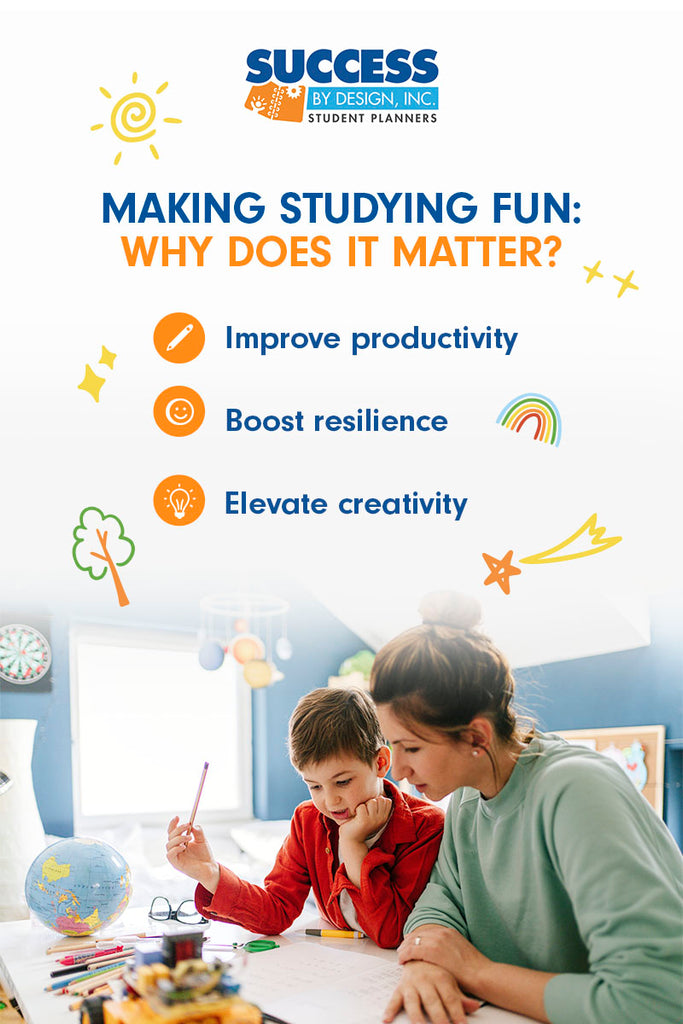
- SBD, Inc.
